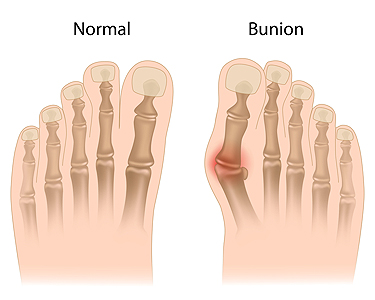
Bunions are a common foot problem that can be painful and frustrating. A bunion can occur when the bone or tissue at the base of the big toe moves out of place, causing discomfort, swelling, and difficulty in finding comfortable shoes. While bunions cannot be reversed without surgery, there are effective non-surgical treatments that can help to reduce pain and improve foot health. Bunions can be caused by factors such as wearing poorly fitting footwear, foot weaknesses, and genetics. Some individuals are more at risk, and people with certain foot types or who wear tight shoes may be affected. Non-surgical treatments for bunions include wearing shoes with a wide toe box and performing foot exercises to strengthen and increase flexibility. Additionally, using orthotics or bunion pads may help provide moderate relief. Surgery is considered to be a last resort for severe cases of bunions when non-surgical treatments fail to provide relief. Various surgical procedures can correct bunions, but there is a risk of recurrence. Implementing lifestyle changes such as choosing appropriate footwear, maintaining a healthy weight, practicing foot exercises, and avoiding high-impact activities can reduce the risk of developing bunions. If you experience discomfort from a bunion, it is suggested that you make an appointment with a podiatrist for a treatment plan that is right for you.
If you are suffering from bunion pain, contact one of our podiatrists of The Podiatry Center, PC. Our doctors can provide the care you need to keep you pain-free and on your feet.
What Is a Bunion?
Bunions are painful bony bumps that usually develop on the inside of the foot at the joint of the big toe. As the deformity increases over time, it may become painful to walk and wear shoes. Women are more likely to exacerbate existing bunions since they often wear tight, narrow shoes that shift their toes together. Bunion pain can be relieved by wearing wider shoes with enough room for the toes.
Causes
- Genetics – some people inherit feet that are more prone to bunion development
- Inflammatory Conditions - rheumatoid arthritis and polio may cause bunion development
Symptoms
- Redness and inflammation
- Pain and tenderness
- Callus or corns on the bump
- Restricted motion in the big toe
In order to diagnose your bunion, your podiatrist may ask about your medical history, symptoms, and general health. Your doctor might also order an x-ray to take a closer look at your feet. Nonsurgical treatment options include orthotics, padding, icing, changes in footwear, and medication. If nonsurgical treatments don’t alleviate your bunion pain, surgery may be necessary.
If you have any questions, please feel free to contact our office located in Millburn, NJ . We offer the newest diagnostic and treatment technologies for all your foot care needs.
